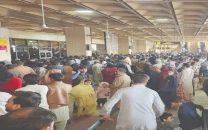Judiciary can interpret law: Shahbaz

Judiciary can interpret law: Shahbaz
He said that the parliament was a representative institution and had powers to legislate. Similarly, the judiciary has the right to interpret laws and play its role in ensuring the supremacy of justice. In a statement issued here, the chief minister said that people from all walks of life, including the civil society and politicians, had rendered sacrifices for the restoration of the judiciary and supremacy of law and he had full confidence that the judiciary would not give a decision that was contrary to the spirit of democracy and the demands of justice.
Separately, Britain’s Deputy High Commissioner in Pakistan Peter Tibber called on Chief Minister Shahbaz Sharif in Lahore on Monday to discuss matters of mutual interest as well as cooperation in various sectors. According to a handout, Sharif said Pakistan was facing a serious energy crisis which was badly affecting industrial, agricultural, trade and other sectors. He said there was a need for working on a war footing for generation of energy for the development and prosperity of the country.
He said special attention was paid to the projects of power generation through hydle, solar, waste, windmill and coal while a 120 megawatt hydle power project was being set up at Taunsa Barrage and generation of energy from sugarcane waste was also being considered. The British deputy high commissioner assured the Punjab government of full cooperation in energy, education and other sectors.



1724319076-0/Untitled-design-(5)1724319076-0-208x130.webp)















COMMENTS
Comments are moderated and generally will be posted if they are on-topic and not abusive.
For more information, please see our Comments FAQ